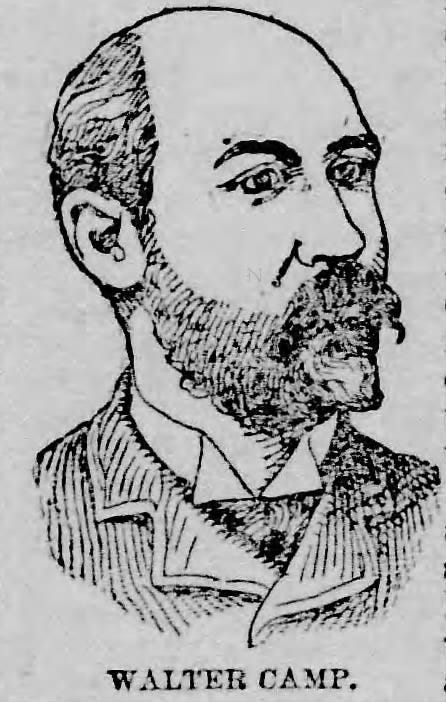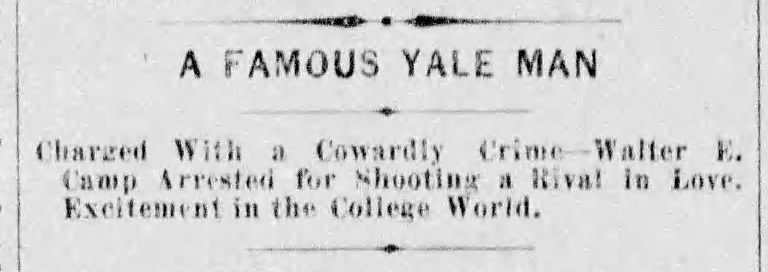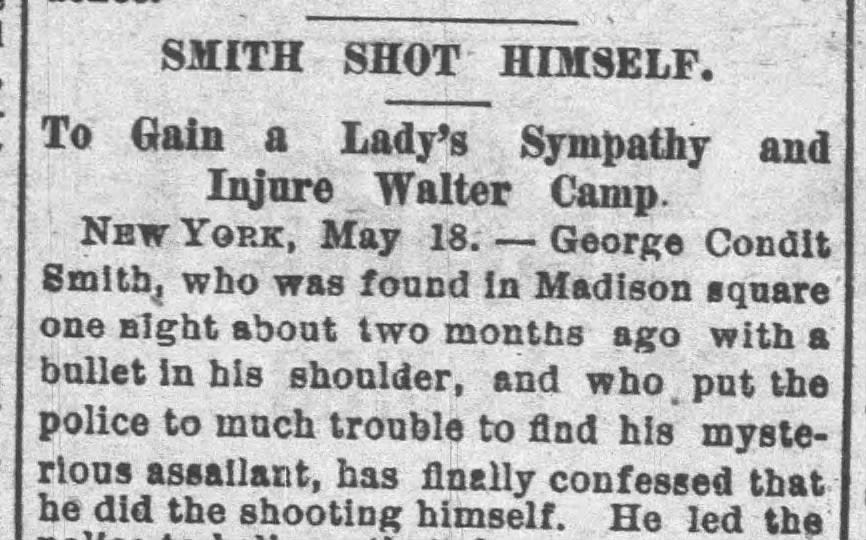Walter Camp Arrested For Attempted Murder
Yesterday's Tidbit covered Walter Camp's activities in 1883, when he dropped out of medical school, turned down a big-league managerial position, became the first football professional, and began working in the watch and clock industry, which would be his vocation for the remainder of his career.
In 1884 or 1885, Camp met and proposed to Sallie Barnes of Paterson, New Jersey. She was an orphan with a sizable fortune but did not accept Camp's proposal, so he stopped calling on her, and life went on. By 1887, Camp worked in New York City, often returning to Yale and New Haven, where his parents lived.
Then things got weird. Early on a Thursday morning in March, George Day Condit Smith, who had inherited a fortune when his father died, was found on a park bench in New York City's Washington Square with a bullet wound in his shoulder. Hospitalized, Smith was reluctant to tell the police about the assailant; other than that, a tall man shot him and ran away. He did, however, mention that he had received an anonymous note warning him to stay away from Miss Sallie Barnes, the woman Camp had courted.
The police quickly surmised that the attempted murder resulted from a love triangle, with Sallie Barnes, George Smith, and Walter Camp being the three points. Early news reports indicated Detective Price found the pistol used in the shooting and somehow traced it to Camp. By noon, Detective Price appeared at Camp's office, where, upon his return from lunch, they questioned and arrested him for attempted murder. As word of the arrest got out, reports of Camp's trouble hit the papers across the country, with the storyline dependent on whether they used the latest news crossing the wires or not.
From the start, Camp claimed he was innocent, explaining that he spent the previous evening in New Haven, refereeing hockey games at a Yale winter carnival, with 500 people witnessing his presence. He left the carnival at 11:30 at night, slept at his parent's home, and took the early train into Manhattan on Thursday morning. Still believing the love triangle theory, the police took Camp to see Smith at the hospital, where Smith declared Camp was not the man who shot him.
With Smith providing little information and Camp ruled out as a suspect, the police made little progress on the case, though many suspected Smith had shot himself for some reason. The story fell out of the news until May when reports surfaced that Smith confessed to shooting himself in an attempt to gain the sympathy of Miss Barnes. Days later, other reports indicated that Smith had not admitted to shooting himself.
Despite the crazy turn of events, Smith succeeded in earning Miss Barnes's affection, and they were married in October, though things did not work well for the Smith-Barnes union. While they were soon blessed with two daughters, Sallie passed away in 1890. George remarried before dying of tuberculosis in 1894, leaving the daughters with their stepmother, who was soon sued for misusing monies intended for her stepchildren.
On the other hand, Camp sloughed off the arrest and all that came with it. He married Alice Graham Sumner in the summer of 1888 and remained with her until he died in 1925. Despite his scrape with the law, Camp went on to a successful business career while remaining the dominant force in football for the rest of his days.
Click Support Football Archaeology for options to support this site beyond a free subscription.










'Walter! Say it isn't so! ..'
Interesting, I had never heard that story on Camp before. This would have made a great 19 th century Law and Order episode!